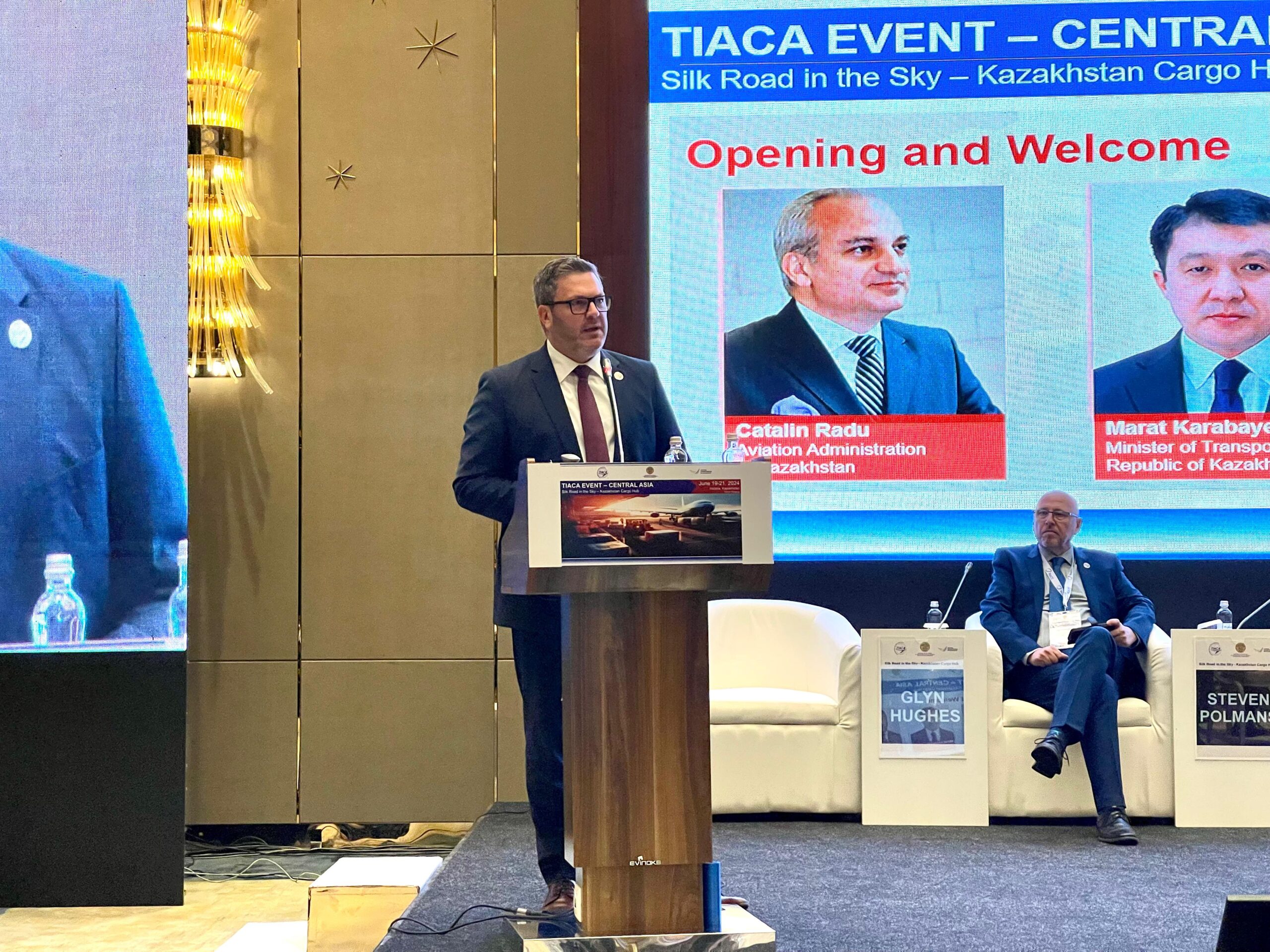ASTANA—Astana hosted the first regional aviation cargo and logistics forum in Central Asia, Silk Road in the Sky—Kazakhstan Air Cargo Hub, from June 20 to 21. It united over 350 aviation industry experts from over 30 countries to explore and discuss Kazakhstan’s challenges and opportunities in becoming an aviation hub and regional potential as a central player in the global air cargo industry.

Silk Road in the Sky—Kazakhstan Air Cargo Hub. Photo credit: The Astana Times
The forum explored transit potential, multimodal transportation, innovation and digitalization in freight transportation, airport
infrastructure, logistics centers, industry regulatory framework, sustainable aviation fuel, cooperation with international carriers and investments in training and personnel.

Catalin Radu, General Director of the Aviation Administration of Kazakhstan (AAK) during the Silk Road in the Sky—Kazakhstan Air Cargo Hub Forum on June 20. Photo Credit: AAK’s press service
“We bring together experts from all around the world to enhance the capability and debate the capability of our country to become one of the most important air hubs here in the region,” said Catalin Radu, director general of the Aviation Administration of Kazakhstan (AAK).
“Air cargo is a complex industry, affected by both international and local factors, but when done correctly, it is an industry significantly impacting economic growth of a region and the country,” said Steven Polmans, chairman of the International Air Cargo Association (TIACA).
Kazakhstan: an air-connected hub
“Kazakhstan is not a landlocked country. It is an air-connected country,” said Polmans during his opening speech, quoting Radu.
Polmans highlighted the country’s eagerness to grow its air cargo sector, describing Kazakhstan as being at an infant stage with significant opportunities for development due to its prime location between east and west.

Steven Polmans, chair of the International Air Cargo Association (TIACA). Photo credit: The Astana Times
One of the critical challenges is the imbalance between imports and exports. Polmans noted the importance of achieving a better balance to attract more business and create a healthier air cargo ecosystem.
“A good balance between import and export is necessary for a healthy air cargo business,” said Polmans.
Glyn Hughes, TIACA director general, expressed enthusiasm about the Central Asian states’ vision to diversify their economies beyond oil, gas, and natural resources. He noted Kazakhstan’s potential to develop a manufacturing sector and leverage its agricultural land for perishables.
“The logistics industry aims to support these governmental aspirations,” Hughes added.
According to Wilson Kwong, CEO of Hong Kong International Air Cargo Terminals Limited (HACTL), Kazakhstan should determine the goods it will focus on and build the appropriate infrastructure to develop into a critical intermodal transport hub.
“We are already seeing developments on the rail side, and I’m sure that, given time, the air cargo logistics development will fully materialize in Kazakhstan as well,” said Kwong.
Fabio Gamba, director general of the Airport Services Association, highlighted Kazakhstan’s efforts and potential in air cargo development. He noted that the thoughtful planning in establishing a major cargo hub demonstrates the country’s commitment to establishing a durable presence in the industry.
“The fact that you ask professionals what it takes is already the first step to success. It shows you are thoroughly considering the necessary steps rather than rushing in,” said Gamba.
Air cargo’s economic contribution and role in the global community
During the COVID-19 pandemic, air cargo was crucial in supporting the global community, especially in transporting vaccines.
“Beyond the pandemic, air cargo is consistently the first responder in humanitarian crises. For example, after the devastating earthquake in Syria and Turkiye, air cargo quickly delivered essential supplies, helping the affected communities survive,” said Hughes.

Astana hosted the first regional aviation cargo and logistics forum in Central Asia, Silk Road in the Sky—Kazakhstan Air Cargo Hub, from June 20 to 21. Photo credit: AAK’s press service
He added that air cargo’s contributions extend beyond emergencies. The industry not only supports communities in times of crisis but also plays a vital role in sustaining the global economy.
According to the UN World Tourism Organization, which Hughes referred to during the forum, tourism contributed $1.4 trillion to the global economy in 2023. Air cargo accounts for only 1% of international trade but is worth $8 trillion, nearly six times the value contributed by tourism.
“To maintain and grow this economic benefit, we must ensure the right infrastructure, relationships, and environment for air cargo expansion,” said Hughes.
According to the AAK, Kazakh companies’ interaction with the world community, the use of advanced technologies, and Kazakhstan’s exports, which increased by $560 million, will help increase trade turnover with Central Asian countries by 2.4 times from $6.3 billion to $15 billion.
E-commerce is another globally booming sector, showing double-digit growth.
Hughes, giving an example, added a touch of humor in his remarks, saying, “My daughter accounts for most of that growth.”
He noted that in the past, fast fashion meant browsing street shops. “Now, with air cargo, we have ultra-fast fashion delivering directly to consumers, bypassing retail stores,” said Hughes.
Strategic vision and prospects
The Silk Road in the Sky – Kazakhstan Cargo Hub Forum aims to contribute to the development of Kazakhstan’s transport and logistics potential, as outlined in the nation’s 2030 plan.
Polmans highlighted the enthusiasm and professionalism within the industry, foreseeing above-average growth driven by economic and GDP increases. He noted the collaborative efforts with Kazakhstan, recognizing the government’s vision as a model for integrating air cargo into the broader economy.
“The 2030 vision developed by the government here in Kazakhstan is a very good example of how it should be done and something many countries could learn from in the period leading to this conference. While working with Catalin Radu and his team, we have experienced that this vision is not just words on paper but a reality happening day in and day out,” said Polmans.
Gamba also noted the government’s support and the broader implications for the future.
“I believe the government is behind this idea of promoting Kazakhstan as a central hub for the future. In the coming five to ten years, there will be significant developments not just in air transport but also in tourism. Visiting Astana for the first time, I was genuinely impressed by how much it has to offer. I really mean it,” he said.
During the forum, individual organizations engaged in negotiations, expected to result in the signing of agreements between several airports, including airports of Astana, Karagandy, and Aktobe, with MNG Airlines (Türkiye), MSC Air Cargo SA, Coyne Airways Limited (UK) and Alpha Sky (Kazakhstan). Memorandums of cooperation between TIACA and local airports of Aktau, Aktobe, Astana, Karagandy and Uralsk, and between TIACA and the Joint Authorities for Rulemaking on Unmanned Systems (JARUS) organization are also expected.

